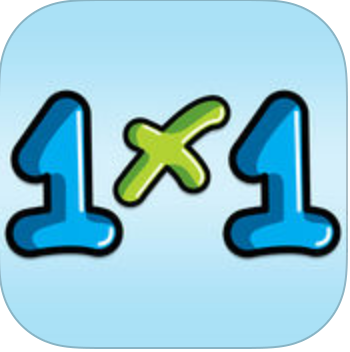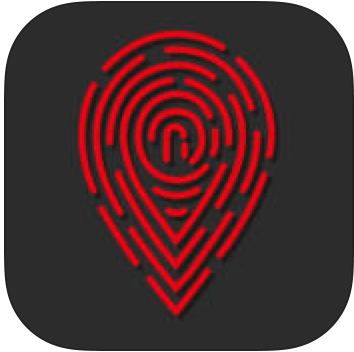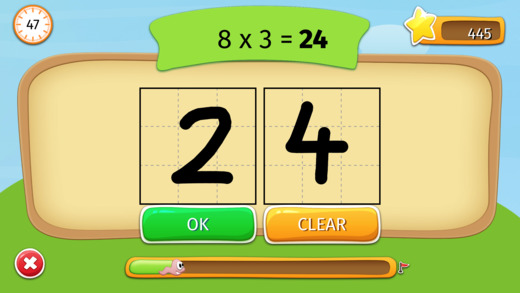Mattias did his master thesis about the „Portability of Mobile Applications“ and presented it successfully during his defense. Here you can find his slides:
[master] Math trainer as a chatbot via system(push) messages for Android #tugraz #research #chatbot
Mirza defended successfully his master thesis about „Math trainer as a chatbot via system(push) messages for Android“. Find here his final slides:
[master] Development of a mobile French language learning platform #tugraz #mobilelearning
Michael did his masterthesis about „Development of a mobile French language learning platform“. You can find here his slides of the final defense:
Klicken Sie auf den unteren Button, um den Inhalt von www.slideshare.net zu laden.
[app] 1×1 Trainer #tugraz #math #ios #android
 Wir haben den 1×1 Trainer grundlegend überarbeitet und mit Handschrifterkennung ausgestattet. Die iOS-Version für iPhone und iPad gibt es schon länger [iOS-Version], nun ist es aber auch die Android-Version verfügbar. Ab sofort können die Kinder also auch dort die Zahlen per Finger eingeben und wir hoffen so, dass es noch einfacher wird mit der App umzugehen. Die Registierung kann direkt in der App oder auch über unsere LearningLab gemacht werden.
Wir haben den 1×1 Trainer grundlegend überarbeitet und mit Handschrifterkennung ausgestattet. Die iOS-Version für iPhone und iPad gibt es schon länger [iOS-Version], nun ist es aber auch die Android-Version verfügbar. Ab sofort können die Kinder also auch dort die Zahlen per Finger eingeben und wir hoffen so, dass es noch einfacher wird mit der App umzugehen. Die Registierung kann direkt in der App oder auch über unsere LearningLab gemacht werden.
The 1×1 Trainer App with handwriting recognition is supposed to help children with learning multiplication tables. The numbers can be written with the finger.
[publication] German Language Training App for Primary School Children #LearningAnalytics #iderblog
At this year Ed-Media conference in Amsterdam we published our research work about „German Language Training App for Primary School Children“.
Abstract:
Mobile apps and the gaming industry experienced continuous growth and popularity over the last couple of years. While children have always played games for fun, researchers, recognized the promising possibilities behind games in the field of education. As nearly every child is in possession of a mobile device today, the sector of digital game-based learning is of special interest. Since primary school pupils often find it difficult to acquire good language skills, this research study deals with the creation of a prototype for tablets to support language training within primary schools. For the evaluation, a field test among children in Austria was conducted in order to see whether benefits could be observed. The extremely positive field test strengthened our approach and further motivated the participants to play the game even after the test was finished.
Reference: Schwaiger, A., Ebner, M. & Ebner, M. (2018). German Language Training App for Primary School Children. In Proceedings of EdMedia: World Conference on Educational Media and Technology (pp. 1202-1210). Amsterdam, Netherlands: Association for the Advancement of Computing in Education (AACE).
[presentation] A Mobile Application for School Children controlled by External Bluetooth Devices #master #tugraz
Valdrin did his master thesis about „A Mobile Application for School Children controlled by External Bluetooth Devices„. Find here the slides of his defense:
Klicken Sie auf den unteren Button, um den Inhalt von www.slideshare.net zu laden.
[publication] Mobile Applications for Encyclopedias #AustriaForum #mobileLearning
Paul developed within his master thesis mobile applications for the Austria Forum. We summarized this work in a chapter about „Mobile Applications for Encyclopedias“ within the book „Mobile and Ubiquitous Learning. Perspectives on Rethinking and Reforming Education“.
Abstract:
In this research work a survey of tested mobile applications will be summarized, which were selected by a few defined prerequisites, and a brief overview is given of what is available in the corresponding stores. It will also be shown how the individual mobile applications for encyclopedias are presenting and providing information to users. This cover its visual representation and the manner in how information is retrieved. Additionally a new smart way will be introduced in which we can deal with information with a special focus to encyclopedias and mobile devices. The prototyped application carries out special features, which makes usage of mobile devices capabilities. The presented approach follows a slightly more aggressive way on how to bring information to users. For example it requires the permission of user and tells him/ her actively that there is an interesting piece of information close by his/ her location. Communication between the device and users is done using the notification system. To satisfy the needs of users a set of options will be presented so that they can customize time and number of notifications. Those settings shall also prevent the battery from draining to fast and give the user control about it. The outcome is a a prototype with a set of features which allows users to retrieve information based on their mood and their willingness of spending effort. If he/ she is eager to learn the application provides ways to support that. If he/ she just want some quick information there are ways to get it. And if he/ she wants a new way of information retrieval via mobile applications for encyclopedias the prototype offers the above mentioned possibility to do so
Reference: Neuhold P., Ebner M., Maurer H. (2018) Mobile Applications for Encyclopedias. In: Yu S., Ally M., Tsinakos A. (eds) Mobile and Ubiquitous Learning. Perspectives on Rethinking and Reforming Education. Springer, Singapore. pp. 229-247 https://link.springer.com/chapter/10.1007/978-981-10-6144-8_14
[iphone, app] CatchApp #AppDevelopment
 Im Rahmen unserer Vorlesung „Mobile Applications 2016“ wurde eine App entwickelt die die Möglichkeit bietet Clubs in Graz zu besuchen und dies auch anzuzeigen:
Im Rahmen unserer Vorlesung „Mobile Applications 2016“ wurde eine App entwickelt die die Möglichkeit bietet Clubs in Graz zu besuchen und dies auch anzuzeigen:
App description: With our mobile application users can see clubs and their population in their near field area. Users can see the total population of a club, friends who are visiting this club and the proportion of single-girls and single-boys in there in form of a number, in percentage and a diagramm. There is a ‚Let’s go Out‘ button. By hitting this button, the user tells the system that he/she is out right now. When he/she is in a range of 30m to a club, he/she gets signed in and his/her friends will see it. This will be possible only during the clubs opening hours. When the user opens the app and is no longer in range of the club he has signed into, he/she gets automatically signed out. He/she get’s also signed out, when the club closes. The Friends-UI contains out of a list of the users friends. He/she can also see who of his/her friends is currently out. We want keep the possibility of adding friends simple, so this can be done by reading another users QR code.

